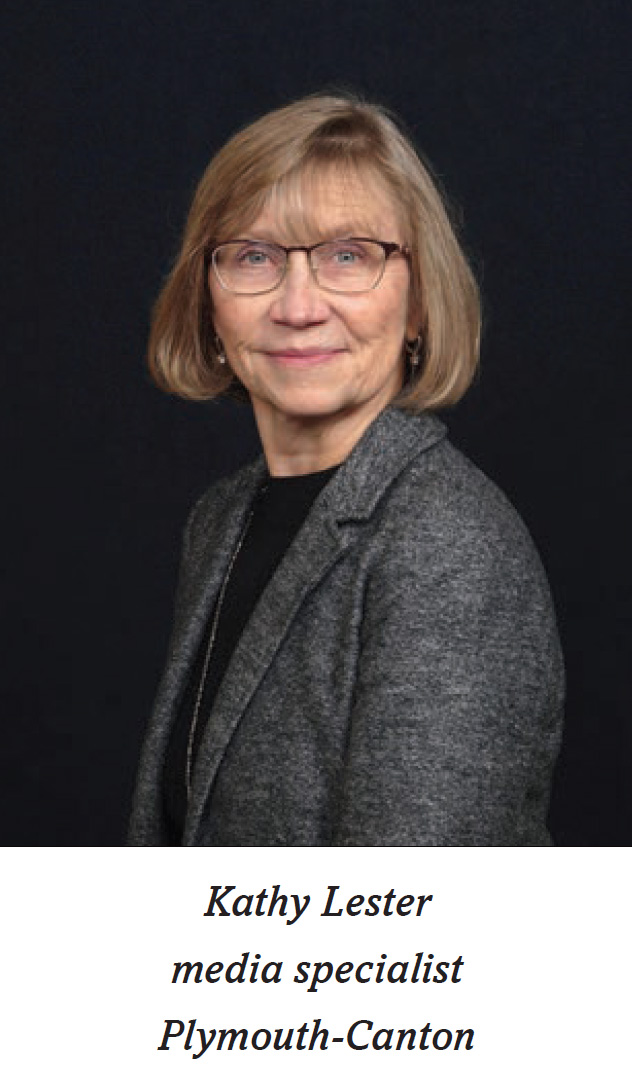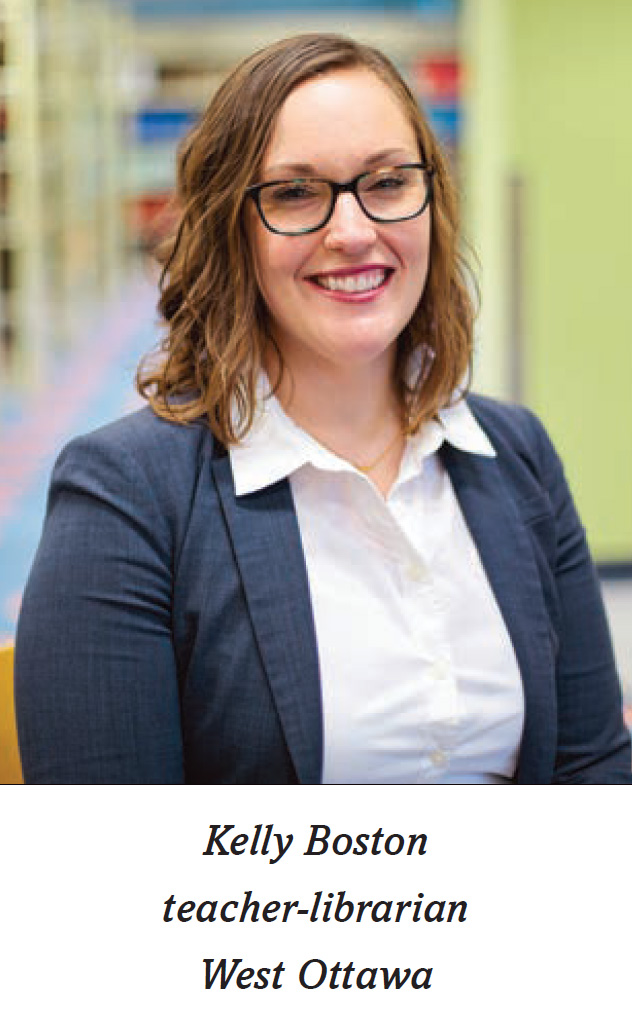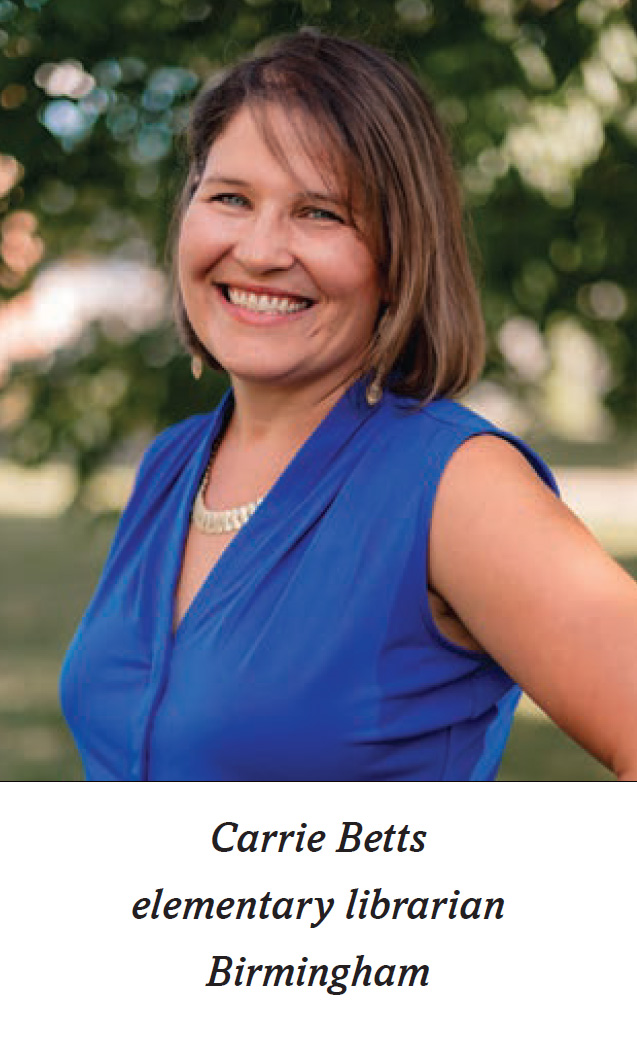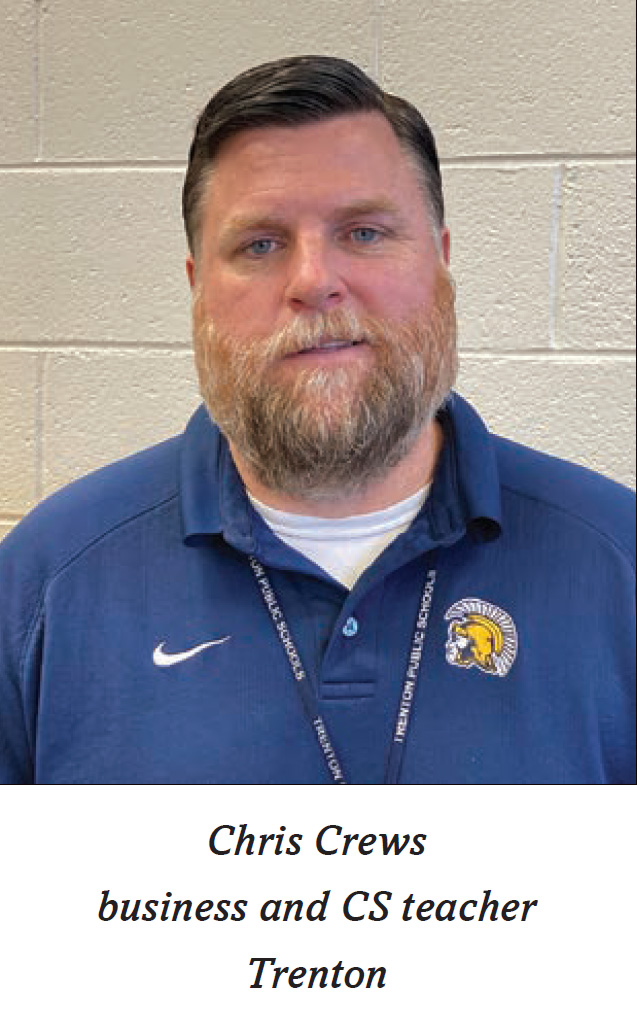MEA Member Librarians Concerned About Decimated Profession
When MEA member Kathy Lester reads the latest news headlines, she sees problems where librarians should be.
 From students’ low reading performance on standardized tests, to community conflicts over what books should be allowed in school, and burned-out educators talking of leaving the profession – librarians can play a vital role in helping to address big problems.
From students’ low reading performance on standardized tests, to community conflicts over what books should be allowed in school, and burned-out educators talking of leaving the profession – librarians can play a vital role in helping to address big problems.
But in Michigan over the past 15 years, the number of certified school librarians – also known as media specialists – has been decimated. In the latest figures, our state ranks 48th in the nation, measured by the ratio of certified librarians to students, at 1:3,110. That compares to a national average of 1:1,425.
State data from last year show more than half of school buildings in Michigan had no school library staff – certified or uncertified – and 74% of buildings had no certified media specialist employed.
For Lester, a certified school librarian at East Middle School in Plymouth-Canton, the losses represent an equity issue. A recent national study showed schools in areas with higher poverty and more minority students and English language learners have the least access to properly staffed libraries.
“If you compare what resources and what educational experiences a student with a highly-qualified school librarian is getting compared to a student in a school district without that, the differences are stark,” Lester said.
A modern school library is a bustling in-person and digital learning commons where project-based learning takes place and print and digital resources are part of a student’s routine, Lester highlighted in a recent informational flyer she produced.
A longtime advocate for the profession through numerous roles she’s played in the Michigan Association for Media in Education, Lester is taking her efforts to the national level. One year ago she won election as president-elect of the American Association of School Librarians.
Lester will serve in the volunteer role for one year, beginning in July, while continuing her full-time job in Plymouth-Canton. She takes over at a precarious time for the profession across the country.
The number of school librarians has declined nationally, according to data released last July in a study funded by the Institute of Museum and Library Services, which found from 2010 to 2019 nearly 20% of school librarian full-time equivalent (FTE) positions were eliminated.
The study found more than 4.4 million students in high-poverty districts had no librarians, and smaller and rural districts were more likely to have no librarians than larger suburban districts.
“The studies all show that students who benefit the most from school librarians are kids from high-poverty areas, and those are the areas where we’re losing the most ground,” Lester said.
Michigan was one of 10 states pointed out in the study for having “extraordinarily high” losses of school librarians over that decade at a staggering 49.5%—which took our state to a bottom-of-the-barrel 48th place in the national rankings of percentage change in school librarians in that decade.
The research is clear that in schools with certified librarians, students’ reading comprehension is higher and the most vulnerable students – who are least likely to have a home library of reading materials – benefit the most.
Multiple studies have demonstrated that school libraries staffed by a certified librarian have a positive effect on literacy achievement and graduation rates.
“Every student deserves to have access to an effective school library led by a certified school librarian,” Lester said.
Media specialists serve in a variety of roles that support learning, she noted. First and foremost, they provide equitable access to diverse resources and support students’ reading and learning in a multitude of ways.
“Media specialists are teachers, too, and the library is the biggest classroom in the school,” Lester said.
Librarians teach information literacy, research, and digital citizenship skills to prepare students for the 21st century world they inhabit, and most serve as technology leaders in their buildings – bringing the latest classroom technology to their buildings and helping educators learn to use it.
 Back in the day, it was film strips; today it’s Google docs and Maker spaces, the 20-year veteran said: “We support classrooms at such a deep level, and that has always been a huge part of the job.”
Back in the day, it was film strips; today it’s Google docs and Maker spaces, the 20-year veteran said: “We support classrooms at such a deep level, and that has always been a huge part of the job.”
Policymakers and even educators don’t realize how much certified school librarians do and what an important role they play in their buildings, agreed MEA member Kelly Boston, who goes by the title teacher-librarian at Harbor Lights Middle School in West Ottawa.
Media specialists teach kids how to use research databases and how to cite sources. They teach information literacy in a digital world rife with disinformation. They work alongside teachers to find additional materials and technology integration to deepen students’ learning, Boston said.
They also make purchases for the library’s holdings based on a professional selection policy that is periodically reviewed. Sometimes the importance of that gets minimized in people’s minds, she said.
“I hear the sentiment a lot that anybody can order books—what else do you do? I don’t want to minimize the importance of having a professional librarian ordering books who’s reading reviews, connecting with students and building relationships to know what genres they love and what they’re going to want to read.”
Introducing kids to books they love is “the best thing that can happen to me. That moment is huge because it’s how we get lifelong readers right there.”
Hand-in-hand with ordering books is defending them, she added, “and right now we’re seeing all of these book challenges in the news. It’s an unfortunate time to be at the end of this decimation of our profession, because a lot of school districts don’t have policies in place for how to protect their books from censorship.”
Other school districts that no longer have school librarians are reaching out to ask how to handle situations with book challenges, “and I say, ‘Gosh – I wish you had a librarian in there because that’s part of my job.’”
Libraries led by certified professionals have processes in place to handle book challenges. Sometimes it simply involves talking with a parent who hasn’t read the material in question, but other times a full review is required and follows a reconsideration policy, Boston said.
A formal review typically requires the objecting community member to read the book and submit objections in writing, followed by formation of a review committee that reads the material and makes a decision which can’t be revisited for a certain number of years.

“If schools don’t have a librarian and don’t have a board policy for this, someone might just say, ‘I’m just going to delete this from the collection to be done with it.’ Then there’s also self-censorship that can occur in the absence of policies.
“I’m very concerned about it, because we serve all of the students in the school. Much of these book challenges seem to be targeting the LGBT community, and just statistically we know we have LGBT students in every school who deserve to see themselves represented in books.”
MEA member Carrie Betts, a certified school librarian at West Maple Elementary School in Birmingham, also is concerned about the vulnerability of districts without trained and certified librarians to lead book selection and review processes.
“Children need books to explore the world around them in an environment that is safe, where they can learn empathy, develop critical thinking skills, and build their own sense of understanding,” she said.
The job of a public school is to provide every single student a full education, and students without libraries or librarians are not getting a fair shake, Betts said.
“The disparity and inequity is my greatest concern. I’ll just use one example – that a student in a school without a certified librarian does not have the same opportunity to learn when they are studying the life cycle of a frog.”
Not only does the student not have a librarian to guide him or her toward a rich supply of current information and resources selected for their high-quality. But librarians also monitor teachers’ curriculum pacing guides and suggest materials for classroom teachers to use to extend and deepen learning.
 “I’m always looking for those resources to really engage students, that are easily accessible to teachers, that I can email to them and save the six hours they would have to spend searching for it on their own, which is time they don’t have,” said Betts, who began her career as a high school science teacher.
“I’m always looking for those resources to really engage students, that are easily accessible to teachers, that I can email to them and save the six hours they would have to spend searching for it on their own, which is time they don’t have,” said Betts, who began her career as a high school science teacher.
Trenton High School teacher Chris Crews can attest to the value that librarians bring to the work of classroom teachers.
Without the work of certified media specialist Melissa Lambert – a fellow MEA member who offers a wide array of services to students through the Media Center – there would be no LitFest or Blind Date with a Book or Maker Lunches at the school, he said.
“She works hard to make the media center a welcoming space where students want to come and grow,” said Crews, who teaches business and Advanced Placement Computer Science.
In addition, Lambert supports teachers by coming into classrooms to deliver instruction on how to find resources, recommend curriculum-based readings, and teach students about media literacy. She stays current with teaching pedagogy to recommend technology that benefits students, Crews said.
Most importantly, he added, Lambert is often the biggest advocate in the district for media selection and offerings at a time when forces are afoot across the country attempting to limit what young people are allowed to read.
“Media specialists often act as the lone advocate for students in regard to media selection. Without them, kids who look different or are perceived as different would not be able to read books about kids just like themselves. Melissa has the courage to fight for those kids every day.”
Related:



